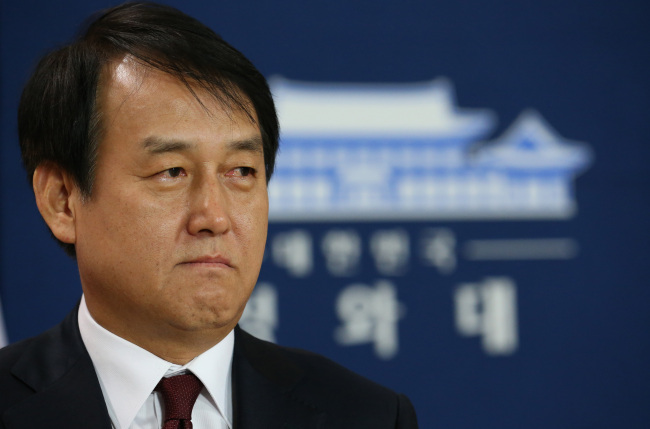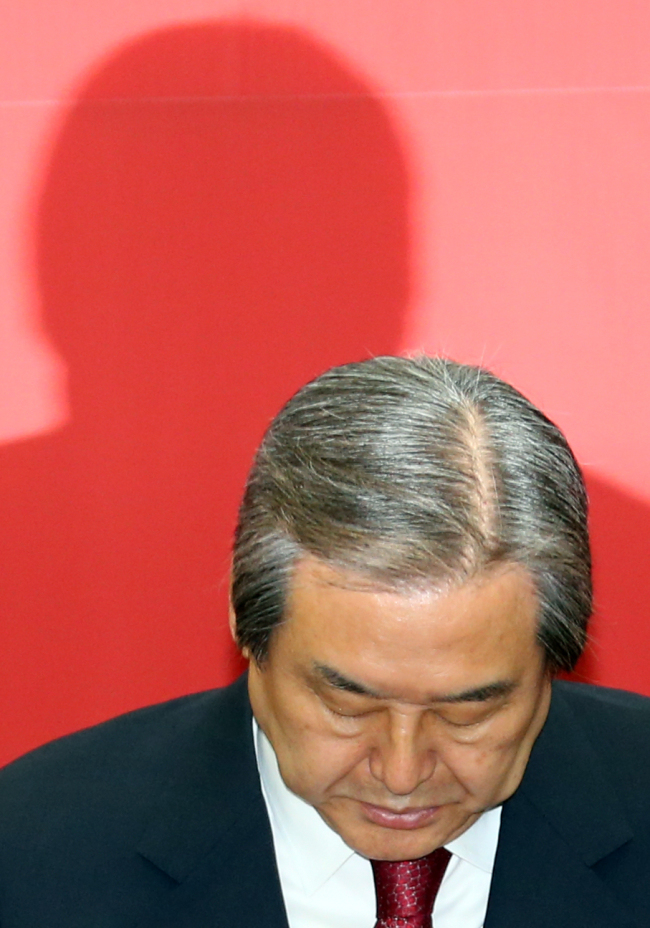“We will make sure to get rid of our arrogance and self-righteousness by gravely reflecting upon the warning by the people through this election,” read a group text message sent by one of the defeated Saenuri candidates to his constituents on Thursday.
Such humbling words were echoed by a number of other Saenuri Party members, as the party struggled to soak in the crushing defeat that stripped them of the majority and No.1 parliamentary party.
Indeed, protracting economic doldrums, the ruling party’s factional backbiting, and the Park Geun-hye government’s lack of flexibility and interaction with the legislature, ordinary citizens and other components of society have come together to ignite a landslide loss in the general election, observers said.
 |
|
Cheong Wa Dae spokesperson Jeong Yeon-kuk pauses during a news briefing on Thursday. (Yonhap) |
Since she took office about three years ago, the conservative president has rolled out a series of policy packages focusing on robust security and economic revival.
While little signs of a growth recovery have surfaced, Cheong Wa Dae has failed, or refused, to consult with the parliament and reflect public opinions to build consensus as it pushed ahead with plans that include contentious issues, such as for the reintroduction of state history school textbooks. It instead denounced opposition lawmakers and other critics as a stumbling block for its statecraft.
On top of the schoolbook drive, the administration has been taking flak for attempting to overpower anti-government protesters and dissent on social media, as well as a legislative push to make it easier for family-run conglomerates to fire workers.
Such heavy-handed moves invited international criticism that the country is backpedaling on democratic freedoms, reminiscent of the era of military rule by the president’s late father and longtime strongman Park Chung-hee. During his visit here last January, U.N. Special Rapporteur Maina Kiai pointed to a trend of “gradual regression on the rights to freedom of peaceful assembly and of association — not a dramatic shutdown of these rights, but a slow, creeping inclination to degrade them.”
Immersed in political infighting and partisan bickering, the ruling Saenuri Party was seen focusing on carrying through the presidential office’s initiatives without taking an in-depth analysis on any policy’s possible outcome and public repercussions. As a result, there have been a string of abrupt shifts in the government’s long-held policies or clashes between the related state agencies.
The counterterrorism act, for which opposition members demanded further revisions through a days-long, world record-breaking filibuster on concerns of potential privacy breaches, was passed early last month with the ruling party’s nearly unanimous endorsement.
 |
|
Saenuri Party chair Kim Moo-sung pauses during a news conference at the National Aseembly on Thursday. (Yonhap) |
“The (main opposition) Minjoo Party benefited from the voters’ desperation to block the Saenuri Party from winning the election once again,” Cho Jin-man, a political science and international studies professor at Duksung Women’s University, said at a seminar Thursday in Seoul.
The minor opposition’s seizure of greater-than-expected 13 proportional seats was also the product of the voters’ “stern judgment” of the major opposition Minjoo Party, he added.
“On its campaign trail, the Minjoo Party was seen putting more energy into attacking the minor opposition People’s Party rather than keeping the ruling party in check, among other missteps,” Cho said. “But overall I think the people made wise choices, even though the parties remain unwise.”
Park Sang-in, a professor at Seoul National University’s Graduate School of Public Administration echoed the view, adding that the voters appear to “have lost confidence” in the current economic policy.
“Though the Park presidency is in its fourth year, there’s no sign that the growth rates will go up, while the polarization only continues to deepen,” he said.
‘If the opposition camp wishes to nail another victory in next year’s presidential election, it should present detailed policies and foster trust that it can deliver, rather than approaching the economy in abstract and emotional terms under the slogan of ‘economic democratization.’”
By Shin Hyon-hee (heeshin@heraldcorp.com)

